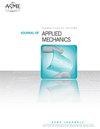The role of frequency and impedance contrasts in bandgap closing and formation patterns of axially-vibrating phononic crystals
IF 2.8
4区 工程技术
Q2 MECHANICS
引用次数: 0
Abstract
Abstract Bandgaps, or frequency ranges of forbidden wave propagation, are a hallmark of phononic crystals (PnCs). Unlike their lattice counterparts, PnCs taking the form of continuous structures exhibit an infinite number of bandgaps of varying location, bandwidth, and distribution along the frequency spectrum. While these bandgaps are commonly predicted from benchmark tools such as the Bloch-wave theory, the conditions that dictate the patterns associated with bandgap symmetry, attenuation, or even closing in multi-bandgap PnCs remain an enigma. In this work, we establish these patterns in one-dimensional rods undergoing longitudinal motion via a canonical transfer-matrix-based approach. In doing so, we connect the conditions governing bandgap formation and closing to their physical origins in the context of the Bragg condition (for infinite media) and natural resonances (for finite counterparts). The developed framework uniquely characterizes individual bandgaps within a larger dispersion spectrum regardless of their parity (i.e., odd versus even bandgaps) or location (low versus high-frequency), by exploiting dimensionless constants of the PnC unit cell which quantify the different contrasts between its constitutive layers. These developments are detailed for a bi-layered PnC and then generalized for a PnC of any number of layers by increasing the model complexity. We envision this mathematical development to be a future standard for the realization of hierarchically structured PnCs with prescribed and finely tailored bandgap profiles.频率和阻抗在轴振声子晶体带隙闭合和形成模式中的作用
带隙或禁波传播的频率范围是声子晶体(pnc)的标志。与晶格结构不同,pnc采用连续结构的形式,呈现出无限数量的不同位置、带宽和沿频谱分布的带隙。虽然这些带隙通常是通过诸如布洛赫波理论之类的基准工具来预测的,但在多带隙pnc中,决定带隙对称性、衰减甚至闭合模式的条件仍然是一个谜。在这项工作中,我们建立了这些模式在一维杆经历纵向运动通过一个典型的转移矩阵为基础的方法。在此过程中,我们将控制带隙形成的条件与Bragg条件(无限介质)和自然共振(有限对应物)背景下的物理起源联系起来。开发的框架通过利用PnC单元的无量纲常数来量化其本构层之间的不同对比度,从而独特地表征了较大色散谱内的单个带隙,而不考虑其宇称(即奇数与偶数带隙)或位置(低与高频)。这些发展对双层PnC进行了详细介绍,然后通过增加模型复杂性将其推广到任意层数的PnC。我们设想这种数学发展将成为实现分层结构pnc的未来标准,这些pnc具有规定的和精细定制的带隙剖面。
本文章由计算机程序翻译,如有差异,请以英文原文为准。
求助全文
约1分钟内获得全文
求助全文
来源期刊
CiteScore
4.80
自引率
3.80%
发文量
95
审稿时长
5.8 months
期刊介绍:
All areas of theoretical and applied mechanics including, but not limited to: Aerodynamics; Aeroelasticity; Biomechanics; Boundary layers; Composite materials; Computational mechanics; Constitutive modeling of materials; Dynamics; Elasticity; Experimental mechanics; Flow and fracture; Heat transport in fluid flows; Hydraulics; Impact; Internal flow; Mechanical properties of materials; Mechanics of shocks; Micromechanics; Nanomechanics; Plasticity; Stress analysis; Structures; Thermodynamics of materials and in flowing fluids; Thermo-mechanics; Turbulence; Vibration; Wave propagation

 求助内容:
求助内容: 应助结果提醒方式:
应助结果提醒方式:


